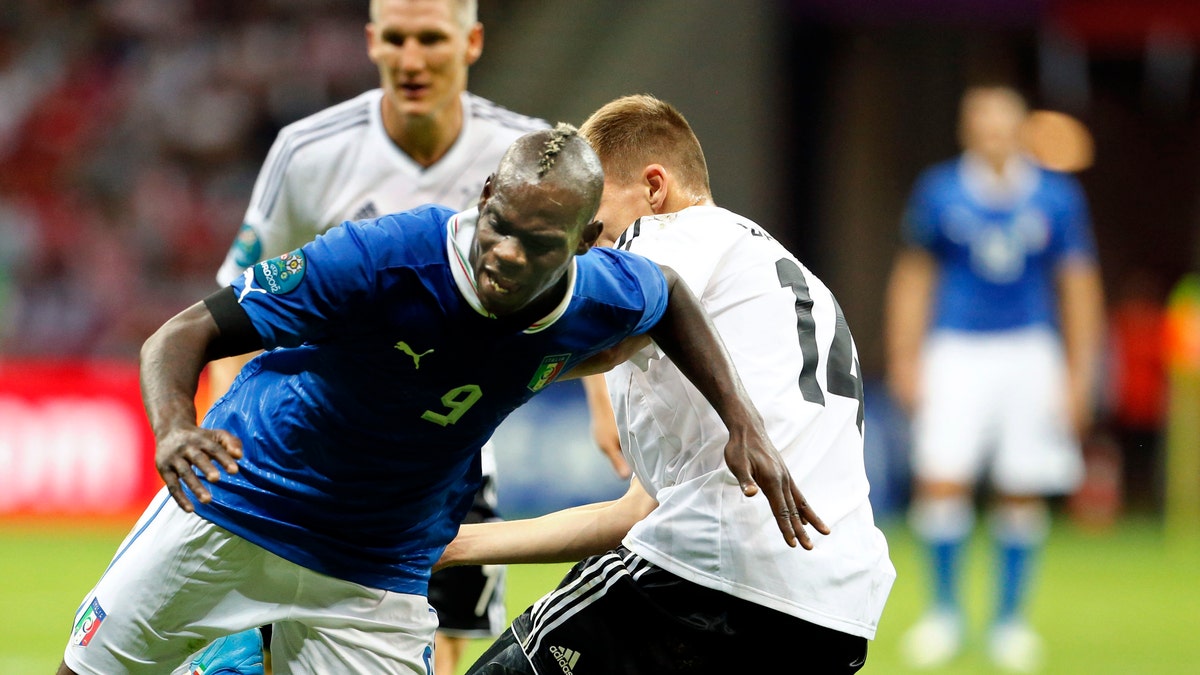
Italy's Mario Balotelli is tackled by Germany's Holger Badstuber during the Euro 2012 soccer championship semifinal match between Germany and Italy in Warsaw, Poland, Thursday, June 28, 2012. (AP Photo/Gregorio Borgia) (AP2012)
Perhaps Euro 2012 will be the tipping point.
Maybe someday, in the (hopefully) not-too-distant future, soccer fans will be able to point to this tournament as a catalyst for change when it comes to the racist behavior and attitudes that have become far too frequent.
Racism cast a pal over this summer’s tournament even before the first teams took to the pitch. Heading into this Sunday’s championship game between Spain and Italy, UEFA has been forced to confront multiple incidents of racism in the monthlong tournament. The topic has grabbed as much attention as anything occurring on the field of play.
Soccer’s European governing body has begun disciplinary proceedings against both the Spanish and Russian federations over their fans’ racist behavior. This comes after UEFA handed down a $100,000 fine to the Croatian federation after its fans directed monkey sounds toward Italian forward Mario Balotelli, who is black. Balotelli is also at the center of the Spanish racism charges.
While appalling, the news is unsurprising. Racism was a major concern heading into the tournament co-hosted by Poland and the Ukraine. Prior to the tournament, UEFA reiterated a commitment to preventing any such problems and empowered referees to stop matches marred by repeated racist incidents. While the organization is conducting multiple investigations regarding racist behavior during the tournament, seeing that officials have yet to halt play makes one question whether such directives were merely a public relations move.
Therein lies part of the problem. Fining soccer federations a few hundred thousand dollars, even millions of dollars, is going to do virtually nothing to quell the behavior of fans who are at the center of this storm.
UEFA deserves some measure of criticism for how this issue has overshadowed the tournament. The organization’s current methods of dealing with the situation have been no more effective than putting a Band-Aid on a broken leg. However, UEFA president president Michel Platini was right when he refused to take full responsibility, declaring, “It's not a footballing problem. It's a problem for society.”
Much time could be devoted to dissecting the causes of racism on the international stage, but ignorance cannot be justified. Moreover, as a global society, we are at a point where it is universally accepted that racism has no place on the soccer field -- or anywhere else.
Still, despite the best intentions and efforts from the sport’s various governing bodies and advocacy groups like Football Against Racism in Europe, the reality is zero-tolerance policies and pregame pledges are not going to make a major difference. The change has to come from the fans themselves, the overwhelming majority of whom do not support the hateful and inappropriate comments that have come to dominate recent headlines.
Reports put the number of fans participating in the racial abuse at a few hundred, maybe upward of 1,000. That’s not a large percentage in stadiums filled with tens of thousands of fans, but it’s enough to sully the reputation of soccer. While silencing racists may be impossible, drowning them out at stadiums is not. Such a simplistic gesture would by no means solve the more complex problem of racism in sport, but the move would be something. It would be symbolic. It would be a start. It would send a message. As it stands, apathy all but signifies acceptance.
Soccer is revered worldwide as the beautiful game. There’s no room in the sport for such ugliness.








































